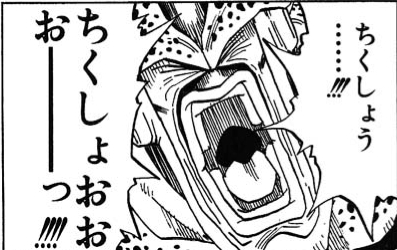
There are some bad words that cannot be included in a blog post of course, so with that said, these words and expressions are rude but not bleep-able. There aren’t really any Japanese swears exactly, however these are close.
Here are some phrases that probably shouldn’t be used very often, (at least if you don’t want to be rude or sound like a manga character)! There are appropriate times to use a few of these without being “rude” necessarily, but it of course depends on the situation.
知るもんか・知るか
どうでもいい
This is along the lines of “who cares” or “whatever”, and literally translates to “anyway is fine” or “however is good”, meaning you really don’t care. It can be used in defeat or rudely.
「もうどうでもいいや…. 送別会なんかしたくない」: Whatever already… I don’t even want to go to the farewell party.
I suspect most of you reading this already know this one, but it has to be included in the list. An interesting thing about ばか versus アホ (the next word in the list), is that depending on where you are in Japan, one or the other is a lot more rude. You probably shouldn’t use either one, but ばか is said a lot more freely in some parts and not considered as rude where アホ is, and in other parts アホ is used more freely and ばか is more of an insult. (For those who don’t know the definition, “ばか” means “stupid”). バカヤロウ is also a common insult heard to call someone.
「ば~っかじゃねぇの!?」: Are you stupid?
「アホか きみは。」: Are you an idiot?
デブ
(lit: You hate fatties?)
「どけよ バカ犬!」: Move it, stupid dog!
「ていうか こんな犬どこから…」: Speaking of which, where did this dog even come from?
こいつ・そいつ・あいつ・やつ
貴様
(きさま)
Yet another “you” pronoun of contempt, this one too is likely to be heard in anime/manga, and is considered an archaic word.
「おのれ貴様ァ!!!!]: You!!!! (*&#$*#!!!)!
~め
This is a derogatory suffix which gets it’s reading from 目. It can be attached to the end of something to show your contempt, like “犬め”, which is sort of like “scoundrel dog” or “blasted dog”. Another word further in the list uses め as a suffix: 畜生め.
「バカめ 寝たフリだ」: Idiots, I’m pretending to sleep.
文句あるのか
(もんくあるのか)
死ね・死ねばいいのに
(しね)・(しねばいいのに)
“死ね” is the imperative form of the verb “死ぬ”, meaning this is a command ordering someone to die. To follow the anime/manga theme example, this could be said by someone during the initiation of their attack in a fight scene. Other phrases related to this are “死ねばいいのに”, or “早く死ねばいいのに” or maybe “死ねばいいと思うよ”, translating to “I think it would be good if you were to die”. This is certainly not something that should ever be said, however is not extremely uncommon to be heard or read at any rate. Not the most mature way to insult someone, but it should do the trick!
「死ねっ!!」: Die!!
「死ねばいいのにね」: I hope you die, k?
煩い
(うるさい)
An adjective meaning “noisy”, うるさい is often used in place of “shut up”. Again though, it can be used to describe something is noisy or annoying. For extra rudeness it can be slurred as “うっさい”, or “うざい”. It’s also common (for roughians) to say it as “うるせぇ”, which applies to a lot of other words, like “めんどうくさい” (troublesome) as “めんどうくせぇ”, or “つまらない” (boring) as “つまらねぇ”. To use an example from earlier, “おまえ” (you) can be heard as “おめぇ”.
「これ危険!危険です危険!危険ですよこれ!気持ちはわかりますが危険ですって!危険!大変危険な危険です!危険!危険ですよ!」: This is dangerous! It’s dangerous– dangerous! This is dangerous! I understand how you feel but I’m telling you this is dangerous! Dangerous! This is extremely dangerous danger! Danger! This is dangerous!
(This one doesn’t actually include “うるさい“, but is a good example of when it might be used).
黙れ
(だまれ)
This is like the “stronger version” of うるさい, and is the imperative version of the verb 黙る (to be silent), commanding someone to shut their face. Another form could be “黙ってよ!”.
「だまれ」: Silence! (Shut up!)
ふざけんな
Stemming from the verb “ふざける” meaning to “joke around” or “mess around”, this is actually used much more seriously than that sounds, and is slurred from “ふざけるな”, meaning “Don’t mess around”.
「ふざけんな!!!」: Quit your #@*!*%&@$!!!
畜生・畜生め
(ちくしょう・ちくしょうめ)
「くたばれ!! ペテン野郎!!」: Drop dead, you fraud!!
糞
(くそ)
This literally translates to “poop”, but can be used as an expression close to “damn!”. It can also be added to the beginning of words like “くそガキ” (stupid brat!), or “くそばばあ” (old hag!). It’s also used as a suffix in the next item in the list as well: “下手くそ”.
「くそ!!」: Damn!
「あつがなついぜっ!!」: The summer is hot yo!
(This is a bad pun for 夏が暑い (なつがあつい))
下手糞
(へたくそ)
The word “下手” by itself translates to unskillful or awkward, and “くそ” was explained in the previous item. The combination of the two means extreme clumsiness, and can be used as an insult translating to something like “You’re hopeless!” or “Give it up!”.
ださい
Like the opposite of 格好いい, and sometimes spelled as ダサい, this translates to “uncool” or “lame”. It could be used to describe somebody them self for instance, or perhaps their sense of style. As mentioned earlier on another word, this one too can often be slurred as “だせぇ” for added emphasis.
Read more Japanese posts at: https://blog.skritter.com/category/japanese/



























